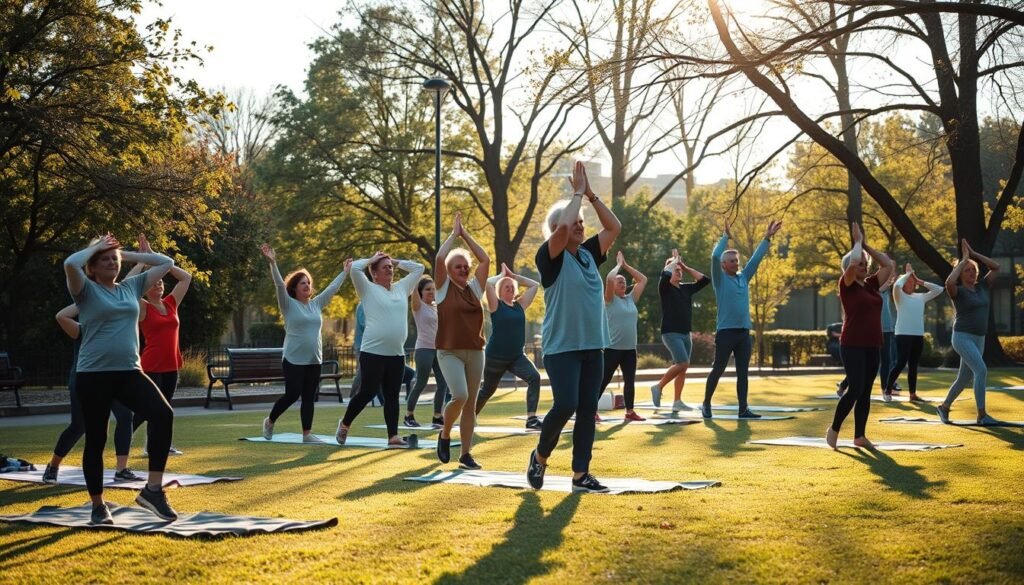About one-third of U.S. adults sleep less than seven hours nightly. This fact shows a big issue—fatigue isn’t just about missing sleep. It’s a complex problem that is often misunderstood. Many people have wrong ideas about fatigue that affect their daily lives.
We aim to clear up confusion about fatigue. We’ll correct common myths and highlight the value of understanding true fatigue. Lifestyle, diet, and mental health all play a role in fatigue. Identifying false beliefs about tiredness is key. This knowledge allows one to find the right help and advice. For more details, check our discussion on debunking fatigue misconceptions.
Key Takeaways
- Fatigue extends beyond simple tiredness and can have various underlying causes.
- Many people fall victim to common misconceptions about fatigue that hinder proper understanding and management.
- Chronic Fatigue Syndrome affects millions and is often misunderstood as laziness.
- Proper nutrition plays a vital role in energy levels and recovery from fatigue.
- Recognizing the signs of genuine fatigue can help individuals seek appropriate solutions.
Understanding Fatigue: What it Really Means
Fatigue is more than just feeling tired. It includes physical, emotional, and mental exhaustion. Various factors cause fatigue, from daily habits to medical issues. Chronic diseases like heart disease and diabetes also add to fatigue. Knowing about fatigue is key. It helps in finding the right treatment and managing it better.
Many don’t know about the hidden causes of fatigue. Not getting enough sleep, eating poorly, and stress are big reasons. Chronic Fatigue Syndrome (CFS) happens when fatigue lasts six months or more without a clear medical reason. CFS symptoms include trouble focusing, a sore throat, and feeling worse after physical activity. It’s important to be more aware of these signs of long-term fatigue.
It’s vital to spread knowledge about fatigue. This is especially true for those with chronic illnesses. Misunderstandings about these conditions can make people feel alone and misunderstood. By increasing empathy and understanding, we can help those facing fatigue. They can find the support and treatment they need.
Common Misconceptions About Fatigue
Fatigue is often misunderstood, causing confusion and frustration. It’s hard to tell it apart from just being tired. Many don’t see how greatly fatigue impacts their lives. It’s a deep exhaustion that doesn’t go away with rest.
The Challenge of Identifying True Fatigue
It’s tough to tell different types of fatigue apart. This leads to many myths. Some think a good night’s sleep fixes everything. But, fatigue is more complex.
People with Chronic Fatigue Syndrome (CFS) feel much worse after activity. This is due to post-exertional malaise. For them, understanding fatigue is key.
Why Fatigue Goes Beyond Just Tiredness
Fatigue is more than feeling tired. It involves complicated processes in the body and brain. It can cause muscle weakness and trouble thinking.
Those with CFS often feel ignored by doctors and others. Fatigue isn’t just about lacking sleep. Special tests, not routine ones, are needed to find the real problem.
Knowing the difference between fatigue and tiredness is important. For many, learning how to adjust their activities can improve their lives.
| Fatigue Type | Symptoms | Management Strategies |
|---|---|---|
| Temporary Tiredness | General fatigue, short-term | Rest, hydration, nutrition |
| Chronic Fatigue Syndrome | Severe fatigue, post-exertional malaise, cognitive impairments | Pacing, specialized medical care, lifestyle adjustments |
Fact vs. Myth: You Just Need More Sleep
The idea that more sleep fixes fatigue is too simple. Sleep quality impacts our energy levels too. Knowing the difference between the amount and the quality of sleep is vital.
Sleep Quality vs. Sleep Quantity
Some think eight hours of sleep is enough to feel refreshed. Yet, sleep quality and sleep quantity both matter. Not sleeping enough hurts our health, but poor sleep quality can leave us tired too.
For those affected, things like noise or room temperature can disrupt sleep. Creating a calming environment is important. Keeping your room cool and dark helps improve sleep.
Medical Conditions Impacting Fatigue Levels
Fatigue can also be due to medical conditions. More sleep won’t fix the exhaustion caused by chronic illnesses or fatigue syndromes. Issues like autoimmune diseases or hormonal imbalances can make you feel tired all the time.
It’s important to understand the root causes of fatigue. Talking to a doctor about specific fatigue syndromes is wise. Better hydration and nutrition can help your well-being too. For advice on lifestyle changes for adrenal health, see this resource.
| Factors Affecting Fatigue | Effects on Sleep Quality |
|---|---|
| Stress | Poor quality sleep, leading to increased daytime sleepiness |
| Alcohol Consumption | Decreased sleep quality, especially during the second half of the night |
| Sleep Disorders (e.g., sleep apnea) | Interrupted sleep cycles, resulting in chronic fatigue |
| Environmental Factors (light, noise) | Disruption of sleep cycles, which impairs restorative processes |
Feeling Tired is Not a Big Deal
Feeling constantly tired might seem small, but it’s a big problem. It affects every part of life, from work to friends. It can stop you from doing even simple things. This leads to not taking care of yourself and feeling worse over time.
The Impact of Chronic Fatigue on Daily Life
When you’re always tired, life gets hard. It’s tough to do tasks that used to be easy. This makes life less enjoyable. Things like stress and lifestyle habits can make it worse. Being tired isn’t just from physical work. How you handle stress and take care of yourself also matters.
Mental Health Symptoms Linked to Fatigue
Fatigue hits hard mentally, too. It can make you feel more anxious, depressed, and stressed. This makes getting better harder. It’s important to look at both mental health and tiredness together. Understanding these links helps find better ways to feel good again.

Juice Cleanses and Energy: The Truth
Juice cleanses offer quick energy and detox promises. Many believe juice cleanses can replace meals full of nutrients. It’s important to focus on nutrient density for energy in diets.
Nutrient Density: Why It’s Essential
Nutrient density looks at essential nutrients per calorie. Eating various foods with vitamins, minerals, and fats is crucial. Such a diet supports energy levels and fights fatigue.
Depending only on juice misses vital proteins and fats. These are key for energy and nutrition. For more on energy levels and nutrition, visit this resource.
Juice Cleanses vs. Balanced Diets
Juice cleanses might cause temporary weight loss. However, people often eat too few calories, affecting energy. Women need at least 1,600 calories, and men need 2,000 daily, but juice diets fall short.
Also, store-bought juices can have too much sugar. A balanced diet is key for lasting energy and health. Eating a variety of foods meets nutritional needs without juice cleanse downsides.
Supplements for Fatigue: Do They Work?
Fatigue can make daily life tough, pushing people to look at supplements for help. It’s key to know both the supplements and fatigue benefits and their risks. Many supplements promise to up energy levels. But they must be used wisely to avoid supplement risks. Learning about these products is crucial for anyone wanting to fight fatigue safely.
Understanding the Risks of Supplements
Some supplements, like vitamin D, iron, and creatine, help fight fatigue. A huge number of people don’t get enough vitamin D, which affects muscle work. High vitamin D doses helped reduce depression in one study within a year.
Iron supplements cut fatigue by almost half in menstruating women in 12 weeks. But, it’s key to know the downside of supplements. They can mess with other meds or worsen health issues, causing side effects. For instance, CoQ10 might lead to stomach problems for some.
Too much of any supplement can be harmful. It’s important to stick to the right dose to avoid health problems.
Consulting Professionals for Supplement Choices
Talking to a healthcare expert, like a nutritionist, can help pick the right supplements. This step is key for those who may lack certain nutrients, such as pregnant folks, vegetarians, or those doing heavy workouts. Nutritionists and fatigue research show that eating well usually covers our nutritional needs. Consulting on supplements can pinpoint specific lacks and safe use.
| Supplement | Potential Benefit | Risks | Recommended Dosage |
|---|---|---|---|
| Vitamin D | Improved muscle efficiency | High doses may cause toxicity | 600-800 IU/day |
| Iron | Decreased fatigue in menstruating women | Excess can cause gastrointestinal distress | 18 mg/day (varies by age/gender) |
| Creatine | Enhanced exercise performance | Possible digestive issues | 3-5 g/day |
| CoQ10 | Energy production support | Mild gastrointestinal issues | 30-200 mg/day |
Understanding supplements is key in managing fatigue. With the right advice and thought, people can make choices fitting their health aims.
The Myth of Eating Less to Combat Fatigue
The idea that eating less can boost energy is wrong. Actually, not eating enough can make you more tired. It’s important to eat enough to meet your nutritional needs for energy and health.
Eating too little, like below 800 calories daily, is harmful. It can cause heart issues. Also, under 130 grams of carbs a day might lead to ketosis, which isn’t always good. Low-fat foods often have a lot of sugar or other stuff that makes them just as high in calories. That’s why we need to clear up these dietary falsehoods.
Not eating enough might make you gain weight. But, eating healthy meals regularly keeps your energy up. Foods like meat or poultry in amounts like three ounces, and carbs from grains, beans, fruits, and veggies are best. These are high in fiber and make you feel full. Regularly eating well is key for managing tiredness. Checkout the importance of balanced nutrition.
Knowing how many calories you eat versus burn is key to not gaining weight. It’s not about cutting carbs but eating right. Watching how much you eat and mixing carbs with proteins and fats can help. This keeps your energy steady all day.
The Role of Exercise in Fatigue Management
Understanding how exercise manages fatigue is vital. Exercise and fatigue are closely linked. Yet, not all activities have the same effect. Gentle movements like stretching and walking can boost energy without tiring you out. Finding the right balance of exercise is crucial when you’re feeling tired.
Gentle Movement vs. High-Intensity Workouts
Exercise that’s low in intensity but long in duration creates more central fatigue than short, intense workouts. Gentle activities are key in recovering from tiredness. Since everyone’s body is different, picking the right level of exercise is important. Too much intense exercise can make you feel more tired. But controlled, gentle activities can help you recover better and feel more energized.
Listening to Your Body: Signs to Rest
Paying attention to what your body tells you is important in dealing with fatigue. Knowing when to rest can prevent making tiredness worse. It’s unwise to ignore signs of fatigue. Pushing too hard can slow down your recovery. Regularly checking your energy levels helps evaluate if your rest and exercise routines work well. Changing how intense your workouts are, based on your current state, can improve how you recover from fatigue and boost your well-being.

Chronic Fatigue Syndrome: A Deeper Look
Chronic Fatigue Syndrome (CFS) is also known as Myalgic Encephalomyelitis (ME/CFS). It’s a complex illness marked by extreme fatigue that doesn’t improve with rest. It’s crucial to understand the symptoms and effects of this condition for correct diagnosis and support.
Symptoms of Chronic Fatigue Syndrome
Knowing the variety of symptoms is key for anyone trying to grasp this tough condition. Main symptoms include:
- Persistent and unexplained fatigue
- Cognitive difficulties, often described as “brain fog”
- Sleep disturbances leading to unrefreshing sleep
- Muscle and joint pain
- Headaches of a new type or severity
- Post-exertional malaise, where symptoms worsen following physical or mental exertion
ME/CFS can look a lot like other illnesses, which makes diagnosing it hard. Doctors use careful exams and tests to clear up confusion about these symptoms of fatigue.
Misunderstandings Surrounding Chronic Fatigue Syndrome
There are many wrong ideas about CFS that contribute to its stigma. One big myth is that it’s all in your head, rather than a real physical illness. This view can make patients feel lonely and ignored by doctors. Being told your illness is “all in your mind” can make living with it even harder.
To fix these wrong ideas, education is key. It’s crucial to spread the truth about Chronic Fatigue Syndrome. This helps build understanding and support for those dealing with it. Groups and researchers are working to raise awareness and share current facts. They say over one million Americans suffer from this tough fatigue syndrome.
| Misconception | Reality |
|---|---|
| CFS is just a form of depression. | Many patients with CFS experience debilitating physical symptoms beyond fatigue. |
| Rest is a complete solution for CFS. | Rest does not alleviate symptoms; post-exertional malaise often occurs. |
| CFS is a rare disorder. | It is estimated that over one million Americans are affected. |
| Only women can have CFS. | Men and women across all ages can develop ME/CFS. |
How Lifestyle Choices Affect Fatigue
It’s key to see how our choices affect tiredness and our overall health. Many adults deal with tiredness for a long time. So, it’s crucial to use good ways to deal with it. Having enough water helps keep our energy up. Eating foods full of vitamins and minerals fights off tiredness.
The Importance of Hydration and Nutrition
Drinking enough water is important for beating tiredness. By choosing water and herbal teas over too much caffeine, you’ll feel more awake. A diet rich in lean meats, fruits, veggies, and grains is best. We should eat foods that are full of nutrients to manage tiredness better.
Stress Management Techniques
Dealing with stress helps fight tiredness. Activities like meditation, yoga, and being outdoors are good for our minds and help us feel less tired. Adding regular stress-relief activities to our day makes us feel more rested and balanced.

| Strategy | Description | Impact on Fatigue |
|---|---|---|
| Hydration | Increased water intake, herbal teas | Improves energy levels |
| Balanced Diet | Foods rich in proteins, fruits, and vegetables | Reduces fatigue |
| Meditation | Practicing mindfulness and relaxation | Alleviates stress and anxiety |
| Physical Exercise | Regular movement to boost energy | Enhances overall wellness |
| Sleep Routine | Consistent sleep schedule of 8-9 hours | Promotes quality rest |
By making these changes, our health gets better and we have more energy. This makes our life better quality. For more tips on managing tiredness for a better day, click here.
Conclusion
Fatigue is more complex than many think. People often believe it’s just about not getting enough sleep or poor health habits. But, chronic fatigue is usually linked with different health issues and stress. This shows why understanding fatigue in our lives matters.
Learning true facts about fatigue helps people find ways to regain energy. Talking openly with doctors and changing life habits are key. Adjusting your diet, exercising, and drinking water helps too. Writing in a journal is also a good way to see what’s causing your tiredness.
To feel better overall, it’s important to look at both mental and physical aspects of fatigue. Conditions like anxiety and depression can make fatigue worse. Seeking professional advice or self-care is crucial. For more help, check out fatigue-related resources. They offer more information and support.